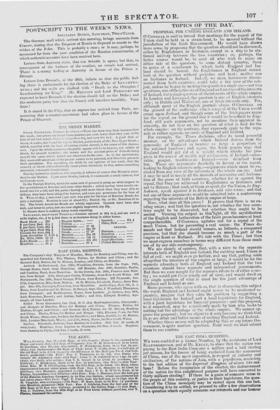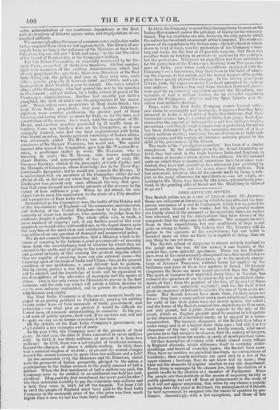THE EAST INDIA QUESTION. THE EAST INDIA QUESTION.
WE were enabled in a ihrmer Number, by the assistance of Lord EL LENBOROUGH, and of Dr. KELLY, to show that the nation was paying to the East India Company a million and a half sterling per annum, for the favour of being excluded from the commerce of China, one of the most important, in respect of industry and civilization, of the nations of Asia, with a population, according to the last edition of the Imperial Almanac, of above 140 mil- lions! Before the termination of the charter, the disbursement of the nation for this enlightened purpose will have amounted to thirty millions sterling! If there be a. grain of common sense in the people of this country, or justice in their legislature, the ques- tion of the China monopoly may be rested upon this one fact Considering it to be settled, we proceed to offer a few observations on a question which equally concerns our interests and our honour
---the administration of our cumbrous dependency in the East, with its territory of 550,000 square miles, and its population of one hundred millions.
We are now pleading the cause of common sense and justice under better auspices than when we last approached it. The friends of mo- nopoly have no longer the influence of the Ministers at their back. CHARLES GRANT will not " fetch and carry," as the last President of the Board of Control did, at the Company's bidding. The last Select Connnittee, as originally nominated by Sir Ro- BERT PEEL, consisted of thirty-four members. Of that number, eight ‘vere members of the existing Administration, which had already prejudged the question ' • three were Directors of the East India Company, the judges and jury in their own case, each with a private property of between 6000/. and 70001„ and a pa- tronage of at least 30,000/. a year to defend. One was a salaried officer of the Company, Who had proved his zeal by his speeches ill Parliament • and yet farther, by a bulky octavo in praise of the Company's administration. Another had recently put forth a pamphlet, the drift of which was the perpetuation of the mono- poly. Seven others were proprietors of East India Stock; two were West India proprietors; two were London Aldermen ; eighteen were country gentlemen, the greater part of them knowing and caring about as much for India as for the laws and constitution of the moon. In a word, with the exception of Mr. HUME, and another member, precluded by ill health from at- tending, there was hardly a man on the Committee, as it was originally formed, who had any local acquaintance with India. One liberal member, having personal knowledge of Indian affairs, was aftCrwards added. Mr. HUME was anxious to secure the assistance of Sir HENRY PARNELL, but could not. The candid baronet who named the Committee, gave him Mr. WALTER B
OR-
RELL, a gentleman skilled in wool; Mr. ELLISON, who is knowing in coal ; Mr. W. Mooaa, who knows something about Dublin, and consequently of fire, if not of coal; Mr. GEORGE BANKES, skilled in the geography of Corfe Castle; and the Marquis of GRAHAM, whose knowledge lies in the Terra Sep- tentrionalis Incognita; but he would not concede Sir HENRY. It is understood that six members of the Committee either did not attend at all, or did not act when they did. The Chancellor of the Exchequer was present only once, although the very first ques- tion that came forward involved the interests of the revenue to the extent of four millions a year. When he did attend, his sole object was to carry the nomination to the chair of a City member and a proprietor of East India stock. Constituted as the Committee was, the battle of the Hindus and of the tea-drinkers of England—of the commerce, manufactures, and industry of the United Kingdom—bad to be fought by a minority of about ten members, who certainly, to judge from the evidence, fought it gallantly. The whole affair was, in truth, a mere mockery of inquiry; and, if any further proof of this were required, we would refer, with confidence, to the report drawn up in the very face of the most clear and satisfactory testimony that ever was adduced on any question of financial and commercial policy.
We do not conceal from ourselves, that a Ministry which is de- sirous of securing to the Indians a wood government—of rescuing them from the overwhelming load of taxation by which they are ground to the earth, and of giving to the commerce, manufactures, and general industry of this country the greatest impulse which I hey are capable of receiving from any one external cause—the Cu-owing open of the trade of India and China—has, in the present condition of our institutions, a most difficult task to perform. But by giving parties a fair field, and showing no favour, truth will be elicited, and the knowledge of truth will be equivalent to the discomfiture of the advocates of monopoly and the agents of abuse. This is the only course for Ministers to pursue in the first instance, and the only one which will satisfy a nation desirous to see its own industry unshackled, and to govern its dependencies with fairness and equity.
The East India Company is at the present moment busily en- gaged in preparing petitions to Parliament, praying for another twenty years lease of their monopoly of trade, government, and patronage :—on what plea or pretext it would be difficult for 1:;mest men, of common understanding, to conceive. In the pre- state of public opinion, their task, if we mistake not, will not lie quite so easy as on former occasions it has been.
Of the defects of the East India Company's government, we shall exhibit, a few examples out of many. In the year 1793, the Company were at the pinnacle of their glory. In that year, the debt of India amounted to seven millions wily. In 1813, it was thirty millions; at present it is forty-two millions! In 1793, there was a net surplus of territorial revenue, beyond the charges, of above a million sterling. In 1813, there was a nominal surplus of 26,0001.; at present the annual charges exceed the annual revenues by more than two millions and a half! In the memorable 1733, the Ministers and the Directors, elated with the prospects of Indian prosperity, pledged to the nation a participation in the Indian revenue to the yearly amount of half a million. When the first instalment of half a million was paid, the
Company were to be entitled to an additional one half per cent. dividend. They paid the first instalment, but never paid another! On their notorious inability to pay the remaining nine millions and a half, they .were, in 1813, let off the bargain. Yet from 1793 to 1813 the people of England must have paid to the East India Company in the monopoly price of tea (the price was then much higher than it now is) not less than thirty millions.
In 1813, the Company avowed their incompetency to carry on the Indian Government, unless the privilege of taxing our tea were con- tinued. The tea exactions are not, however, the only ones to which the nation has to submit on account of the Company. The whole ex- penses of the squadron in the Indian seas—the sole object of which, down to 1813 at least, was the protection of the Company's terri- tory and trade, for the best of all possible reasons, that there was no other trade or territory to protect—is paid not by the prot6es:s, but the protectors. Inenever an expedition has been undertaken for the protection of the Company's territory from European ene- mies in India, even when such expeditions originated with the Company's own Governors, they have been in the habit of charg- ing the expense to the nation, and the honest keepers ofthe public purse have quietly allowed the chave. In the twelve years from 1794 to 1806, the expenses under this head amounted to eight or nine millions. Between two and three hundred thousand pounds were paid for an inte1d expedition against the Mauritius, and upwards of half a million sterling for an infriuled expedition against the Philippines. Ceylon and the Spice Islands cost the nation four millions sterling.
Thus, while the East India Company conies forward with a new claim to sovereignty and monopoly, it appears that they have incurred in India a hush debt of thirty-five millions ; that their territorial revenue has, iet a period of tidily-four years, been dete- riorated to the amount of between thr:!.2 and four millions sterlinz per annum ; and that, through charges real or pretended, the nation has been defrauded by them to the enormous amount of at least eighty millions sterling, excluding the naval charges of eight-and- twenty years, and the capture of extensive colonies placed to the debit of the government of the Crown.
The trade of the " prodigal corporation " has been of a similar complexion. By the estimate given by the Select Committee of 1812, they had sunk in the trade between India and England, in the course of seventeen years, above five millions. On the reduced scale on which their co:nmercial operations have been since con- ducted, they have lost, according to a statement just exhibited by themselves, during the last ten years, above four millions. This last statement, however, like all statements made by them, is sub- ject to the usual allowance for mystification,—an art which, ac- cording to Mr. Minn, they have, for 160 years, systematically prac- tised, to the puzzling alike of friend and foe. Shall they be allowed to go on ?



























 Previous page
Previous page